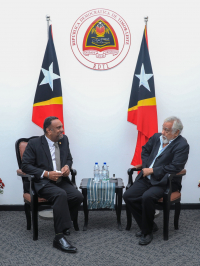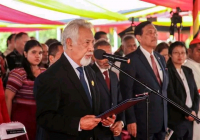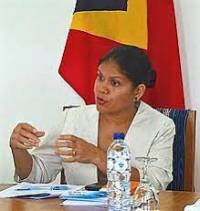Arsica is one of the thousands of children who were forcibly removed from Timor-Leste during the Indonesian occupation, which is a war crime. After 41 years she was reunited with her family.
‘I am very grateful that my parents are still alive. I am so thankful for this beautiful moment to be reunited,’ smiles Zequelina Soares (48), given name Arsica, while sitting next to her mother. She arrived five days earlier from Indonesia for an emotional reunion with her family in Timor-Leste after having been separated for 41 years. ‘Not a single day passed that I didn’t think about my daughter. I remember it so well. She was such a cute, lively, happy and healthy girl,’ says her mother Anita Soares (65), while her eyes light up for a moment. Her husband, Marcelino Soares (68), sits quietly in a chair and nods.
Their daughter was kidnapped during the brutal Indonesian occupation. In 1975 Indonesia invaded Timor-Leste with extreme violence. The population was bombed, terrorised, killed, tortured, raped and starved. While Marcelino joined the Fretilin guerrilla fighters, Anita fled like many other Timorese to the mountains hoping to be safe, but suffering hunger and disease caused by the Indonesian army wreaking havoc.
Abduction
Out of despair Anita and her family surrendered in 1978. Indonesian soldiers drove them down the mountain. ‘We arrived at a river,’ says Anita, while taking her daughters hand and continuing the tragic story. ‘An Indonesian commander grabbed Arsica. He said: “She is mine, not yours.” I cried and fought back so he could not take her,’ Anita tells. While the young mother struggled, her frightened little daughter started crying. Then the commander hit Anita with a gun and forced her on the ground. She hit him back. Twice. ‘I was so angry. But then the commander wanted to shoot me. When I was about to be shot, another soldier calmed the situation down to draw the attention away, and the commander took the child.’ It was the last time she saw her daughter. While Anita tells the story, the mood in the room has changed. Arsica is looking sad, while her father is staring in front of him.
Illiterate
To no avail Anita tried to find her seven year old daughter, while Arsica initially stayed not far in a military camp in the town of Aileu. Until commander Nampoleaun took her to the Indonesian province of Sulawesi, where for one year the abducted girl lived alone with him, a single man, in the barracks. When the commander married and had children, Arsica became part of the family. ‘I don’t know why my stepfather took me from Timor-Leste,’ she says. ‘But he took good care of me. I was not abused. I had a normal life,’ Arsica tells. When she is asked to spell the name of her stepfather, however, she admits she is illiterate. Suddenly there is a painful silence. ‘I didn’t want to go to class, and always ran away from school,’ Arsica explains with a smile. ‘But that’s something I now regret.’
Arsica got a new name: Yanti. The catholic girl became Muslim. ‘But my stepfather never hid from me that I was Timorese,’ she tells. ‘The only thing that makes me feel bad is that I did not grow up with my own parents. I feel the missing. It makes me very sad now.’
While Arsica stayed in Sulawesi, her family lived in fear during the Indonesian occupation, which cost the lives of at least 102,800 Timorese, who mostly died of starvation and disease (the death toll could be as high as 183,000 people, on a population of about 600.000 people). Two daughters of Anita and Marcelino died of hunger. Despite the massive hardship they experienced, they managed to get their six other children to school.
Letter
In all these years only twice they received notice that their stolen daughter was still alive. Unexpectedly there was a message in 1989 from the commander who was back in Timor-Leste, in the town of Ainaro. ‘When I met him, he told me: “Your child is with me, and she is fine.” But I was sad because she was so far away. He gave me their address and telephone number in Sulawesi. But I never heard anything from her,’ tells Marcelino.
Then in 1991 Marcelino sent a letter through the Indonesian Red Cross to his daughter. ‘I replied,’ says Arsica, who was helped when writing her answer. Marcelino wrote back, but his letter ended up with a corrupt person. ‘To be able to receive the letter, the Red Cross asked 8 million rupiah (now some 500 dollars),’ Arsica tells. She refused to pay. The contact with her family ended.
War crime
Also the historic referendum in 1999, when the Timorese chose for independence, didn’t bring them together. The Commission of Reception, Truth and Reconciliation (CAVR) stated in its report Chega! that at least four thousand children were forcibly removed from their families during the occupation and were taken illegally to Indonesia, which is a war crime. Indonesian military took children from their families to break the resistance, to use them as child soldiers or servants at home. Islamic organisations converted children to Islam. Even if there were more charitable motives or permission was requested from families, futile efforts were made to keep contact which resulted in children losing their Timorese identity, cultural roots and their families.
Missing persons
The stolen children are part of a wider crime of forced disappearances. The Chega-report stated that 18,600 Timorese citizens were killed or disappeared during the conflict. Both the CAVR and the Commission on Truth and Friendship (CTF), which was jointly set up by Indonesia and Timor-Leste in 2005, obliged the governments to create of a special commission to search for the missing, says Sisto dos Santos, outreach director of HAK Association, a human rights organisation in Timor-Leste. But this hasn’t happened. ‘There is no political will, particularly from the Indonesian side, to realise the recommendation to set up this commission,’ Dos Santos states.
While Indonesia signed but didn’t ratify the International Convention for the Protection of All Persons from Enforced Disappearance, Timor-Leste didn’t even sign the convention. ‘Our government says it is easier for Timor-Leste to follow if Indonesia first ratifies,’ states Dos Santos. ‘Politically we are independent. We have a national flag and a president, but with regard to the issue of past crimes by Indonesia, our politicians are still influenced by the Indonesian government. The struggle to find truth still goes on,’ says Dos Santos.
Tracing stolen children
While the governments remained inactive, in 2010 Timorese and Indonesian activists took the initiative to work together to find the stolen children, often using their own money and resources. In 2013 a working group was established by NGOs and organisations* from both countries. ‘So far we traced 138 children. We have reunited about eighty children with their families,’ says Dos Santos. The efforts of the group are supported by Timor-Leste, but not by the Indonesian government. The NGO investigations can actually be challenging. ‘When Indonesian colleagues were tracing some children, several Indonesian military tried to stop them as they were directly involved in the disappearances,’ explains Dos Santos.
Meanwhile the fate of most of the stolen children is not known. ‘Enforced disappearance is a continuing crime as long as the families don’t know what happened to the children,’ says Dos Santos. As time passes, several Timorese families who assumed their lost children had died made symbolic graves. ‘But if stolen children are then found alive, this is an extra painful aspect on top of everything else. When the families are reunited, the children have to do a ceremony to be taken out of the grave, which again is very traumatising’, Dos Santos tells.
Reunion
Arsica was only found last July by the NGOs. On 11 November 2019 she travelled as part of a group with thirteen other stolen children to Timor-Leste. So far seven of these large reunion trips have been organised. ‘But Indonesia doesn’t show any goodwill,’ states Dos Santos. The central government in Jakarta gave just 3,000 dollars for the last trip. Timor-Leste paid 37,000 dollars. NGOs, ICRC and the Red Cross in Timor-Leste paid the rest.
During the welcome ceremony in November, the current Indonesian ambassador to Timor-Leste said he objected to the word ‘stolen’ children and preferred the term ‘separation.’ Semantics are ‘part of the distortion’, says Dos Santos. ‘They create a new narrative which is a perversion of the truth. We see this happening for all the crimes committed by Indonesia, including the stolen children. The authorities don’t want to recognize their past and make sure they never have to apologize.’
He calls on the international community to support the quest for justice. ‘There is impunity and there haven’t been reparations for the survivors,’ says Dos Santos. Recently the Centro Nacional Chega (CNC), an independent institution in Timor-Leste established to facilitate implementation of the recommendations of CAVR and CTF, created a solidarity fund to which everybody can contribute. ‘The parents of the stolen children, many of whom live in poverty, are one of the target groups,’ tells the HAK-director.
Father Marcelino has an urgent request as well. ‘Timor-Leste brought my daughter back. But I want the governments to help other families with information as well, in order to bring all the lost children back home,’ he says.
Smiling and holding hands
Immediately after her arrival in Timor-Leste, the family took Arsica to their home in Aileu. To welcome her and bring back her soul, her uncle sprinkled water on her. The family wrapped her in tais, a coloured traditional woven cloth. No, says her mother, it never crossed their mind to make a grave for her. They were always hopeful that one day she would return.
But communicating is difficult. Arsica has forgotten her mother tongues, Tetum and Mambai. She speaks Indonesian, a language her mother only understands but can’t speak. They mostly smile and hold hands. The fact that she wears a hijab, is not a problem. ‘There is only one God,’ says Marcelino. The other day the commander who kidnapped Arsica phoned him. ‘I thanked him for looking after my daughter for many years. The commander thanked me too,’ Marcelino says.
But when her opinion is asked about the commander, Anita looks furious. ‘He hit me and almost shot me. He took my child with force. He promised to look after my child, but she never went to school. I don’t forgive him.’
Farewell
The pain of the farewell is palpable. For a week Arsica felt the warm embrace of her Timorese family. But her life is in Indonesia, where she has two children and grand-children. Every day her family calls her. ‘They ask me not to stay in Timor-Leste, but to get back as soon as possible,’ she says. Arsica wants come back to visit her Timorese family, although she has no money for the journey. Fearing the worst, her mother Anita says with tears in her eyes: ‘I am afraid I might never see her again.’
* The group includes ACbit, AJAR, HAK, IKOHI, Komnas HAM, Kontras Jakarta and Sulawesi, ICRC, Red Cross Timor-Leste (CVTL) and the Ombudsperson in Timor-Leste.



